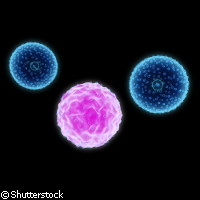Lockdown on leukaemia cells' gene addiction
New research targeting acute forms of leukaemia, led by the University of Vienna in Austria, spotlights a new drug target to inhibit the genes that help develop the diseased cells. Published in the European Molecular Biology Organization (EMBO) Molecular Medicine journal, the study's findings demonstrate how leukaemia cells become 'addicted' to genes, which if targeted could thwart the development of diseased cells. Professor Veronika Sexl of the university's Institute of Pharmacology, Centre of Biomolecular Medicine and Pharmacology, along with her colleagues, investigated acute lymphoid leukaemia (ALL) and chronic myelogenous leukaemia (CML). The researchers say both ALL and CML can be triggered by the Bcr-Abl fusion protein, which emerges through the joining of two or more genes originally coded for separate proteins. The researchers from Austria, Germany, Italy and the US explain how a complex tumour-supporting 'network' emerges once the genes have joined. So not only do the leukaemic cells get the boost they need, but they also have a higher chance of survival. Inhibitor drugs including 'Imatinib' can block key signals and cause the death of the diseased cells. The problem is that a number of mutations can defy these inhibitors, effectively giving them the means they need to continue their onslaught on the human body. In order to get ahead in the game, the researchers evaluated transcription factors Stat3 and Stat5 which are connected to Bcr/Abl-induced transformation. Their testing focused on whether Stat3 and Stat5, acting downstream of Bcr-Abl, are vital for maintaining leukaemia, and whether they could be used to treat this disease. 'We developed a tumour-specific gene-deletion approach to analyse the roles of Stat5 and Stat3 in Bcr/Abl-induced leukaemia growth,' Professor Sexl explained. 'We discovered that both factors are required for the development of Bcr-Abl, but once established, only Stat5 is crucial for the survival and growth of leukemic cells.' What they found was that even mutated forms of Bcr-Abl, leukaemia cells that can still fight the inhibiting drugs, are dependent on Stat5. 'Cancer cells undergo extensive adaptations in their signalling and metabolic pathways, thereby becoming dependent on certain genes,' Professor Sexl said. 'In fact, the activity of these genes can become limiting for a cancer cell.' The team calls this phenomenon of gene dependency 'non-oncogene addiction' (NOA). They add that by inhibiting these critical genes within the signalling network, the system could fail and the diseased cells could stop growing. 'In this study we demonstrated that Bcr-Abl, leukaemia cells are addicted to Stat5 to maintain the leukaemic state,' Professor Sexl pointed out. 'We've identified Stat5 as an Achilles' heel in the signalling network downstream of Bcr-Abl. Thus, inhibition of Stat5 may provide a novel therapeutic approach for treatment of leukaemia.' Also contributing to this research study were scientists from Austria's Research Institute of Molecular Pathology, the Max F. Perutz Laboratories, the Ludwig Boltzmann Institute for Cancer Research and the Research Center for Molecular Medicine of the Austrian Academy of Sciences, as well as the Molecular Biotechnology Center, University of Turin in Italy, Deutsches Krebsforschungszentrum in Germany, and the National Institute of Health in the US.
Countries
Austria, Germany, Italy, United States



